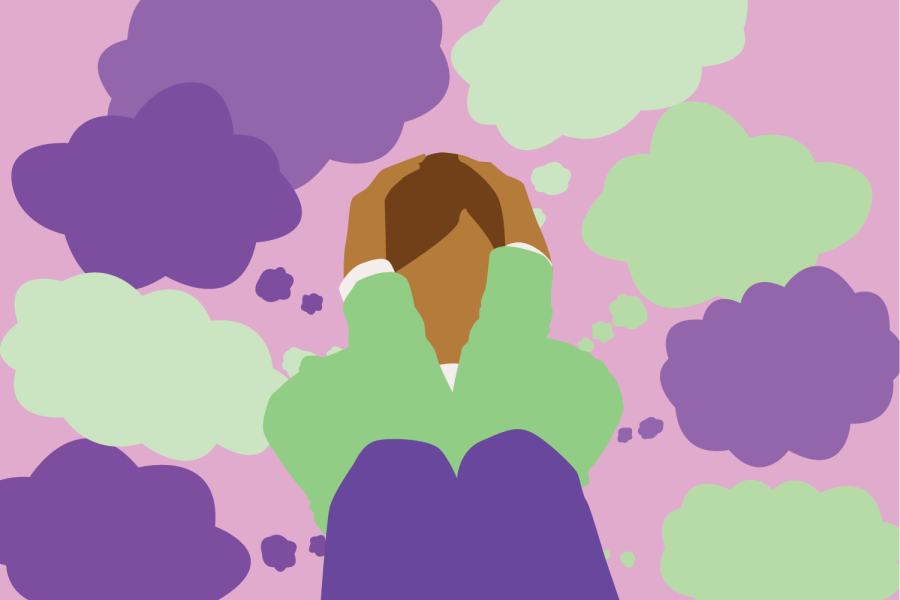Op-Ed: One million inhales, zero exhales
Photo credit: Graphic Illustration by Molly Solowitz
The graphic illustrates how I feel when I’m having an anxiety attack. Experiencing anxiety in silence has led me to drown myself in a million thoughts all at the same time. It’s time to create a safer and more authentic space in conversations about mental health.
January 31, 2022
Uncontrollable breathing. Trembling. Nausea. Suffocation. Feeling a million thoughts at once. These are my symptoms during an anxiety attack.
My body takes on a life of its own as a result of my unsteady breathing. I hyperventilate due to the shaking. The sickness makes me fear that something more serious is going on. Even if the problem is that I’m inhaling too much, the suffocation makes me feel as if I can’t breathe. A flurry of confusion and uneasiness take up all of the space in my brain. I feel a lump in my throat and I try to get out words, but I can’t.
It’s not all in my head. These are all physical symptoms.
Anxiety attacks and mental health are just as serious as any other illnesses. It’s beyond time to start treating it like such. Even though more people are talking about it and starting to normalize seeking help, anxiety still has a stigma attached to it.
According to the National Institute of Mental Health, 19% of adults and 32% of teenagers have suffered from anxiety in the past year. Young people experiencing depression and anxiety at higher rates shouldn’t be seen as normal.
These statistics emphasize you never know what is going on in another person’s head. We are in the midst of a pandemic; in no way is that easy. COVID-19 has altered our way of life. The fact that more people feel anxious and stressed is not surprising.
So, why is it still so difficult to discuss this topic? People are afraid of being vulnerable.
I now feel comfortable with being vulnerable, particularly when it came to my mental health. But that wasn’t always the case. I believed that everything I was feeling wasn’t valid, that I could simply “calm down” and everything would go away. Being vulnerable is challenging enough on its own, but it becomes even more difficult when society stigmatizes mental health.
When explaining what anxiety feels like to me, I now always give the example of what we are living through right now: the pandemic. Every second feels like living in a state of limbo. It feels like I have to be in charge of every aspect of my life, and if I don’t, I’m stuck within the current of overwhelming tides. Sound familiar?
These waves debilitate me.
On top of that, academic pressure, maintaining a social life and any type of relationship add layers to these waves. These things bring a lot of joy, but why do we overlook the other side of them? Talking about our difficulties is equally as valid as talking about our successes. This stigma pushes us to suffer in silence.
I have tried everything in the books. I see a therapist, and I cannot begin to emphasize how great it feels to converse with a professional. Whether our conversations ended up being about what my favorite song was or me explaining why I feel like I’m not enough, I was finally able to exhale. I have tried meditating, but it didn’t work for me. Being alone with my thoughts as the Calm app spoke in a mellow tone only intensified my uneasiness. I’ve tried breathing hacks, from counting my inhales and exhales, to laying down on my stomach and hearing me breathe.
I’ve tried it all.
My point is, if you have anxiety, it is all right if certain techniques or advice people share aren’t for you. It is your body, it is your emotions and it is your mind. The fact that you are trying to see what works is something to celebrate already.
When I first opened up about my anxiety, I remembered I wanted every piece of advice to work instantaneously. I was so focused on getting rid of my anxiety at any cost, but forcing a million techniques only made me feel worse. Anxiety itself isn’t the villain here.
Don’t get me wrong, I’m thrilled that more people are talking about mental health and the importance of seeking help. That is already a significant step forward. Yet, with this increase in information about mental health, I still feel like there are undertones of judgment that plague each conversation.
Be supportive of one another. Don’t be performative. The simple act of listening to someone or just being with them, even in silence, can help significantly.
Learn as much as you can about the complexities of mental health. It’s not something people choose to experience. And it isn’t something that will simply vanish. Education is power, and informing yourself can help someone close to you.
If you deal with any of this, I won’t sugarcoat and say it’ll get better overnight. I still fight with my own anxiety. But, it truly gets better, little by little, when we seek help and talk about it.
I know you have the courage to keep going and when you feel like you don’t, it’s okay. Take all the time you need. All I ask is that you keep trying and fighting. Your emotions are nothing to be ashamed of.
For what it’s worth, I accept the genuine me. I accept how my leg randomly begins to tremble underneath the table. I accept the tears I need to shed. I accept the times I need to pause and recalibrate.
Anxiety feels like one million inhales and zero exhales. But we still breathe in and breathe out. In again, out again. We got this, even when we feel like we don’t. I am so proud of us.










Ms. Geffen • Feb 22, 2022 at 11:37 pm
Wow! This article is so honest, so vulnerable and so beautifully written, Lizette. Thank you for sharing so bravely and for not sugarcoating yourself. Your advice– to listen even in silence, to learn and to not expect anxiety to vanish or to blame the one going through it– are important reminders to me and others. Really well-written story.
Tiffany Smith-Anoa'i • Feb 11, 2022 at 10:39 pm
Thank you Lizette for your transparency in this article, I learned a lot. Beautifully and authentically written.
Brava! Big hug!